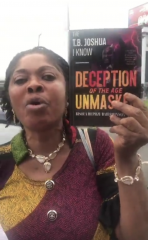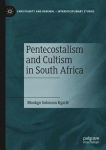 Leading the Synagogue Church of All Nations (SCOAN) based in Nigeria, late Prophet T.B. Joshua (1963-2021) has been one of the most prominent African neopentecostal prophet of the last 40 years. The recent BBC documentary reveals he committed systemic abuse on some women and disciples.
Leading the Synagogue Church of All Nations (SCOAN) based in Nigeria, late Prophet T.B. Joshua (1963-2021) has been one of the most prominent African neopentecostal prophet of the last 40 years. The recent BBC documentary reveals he committed systemic abuse on some women and disciples.
To the people who challenge BBC's timing and European/white angle, let's remind them that huge evidence was already revealed 4 years ago by Lady Bisola Johnson in a very long TV interview in Abuja to Asabe Afrika TV (a purely African TV) by Lady Bisola Johnson (link).
Evangelist Bisola Hephzi-Bah Johnson, who escaped T.B. Joshua's cult after heavy involvement in the Prophet's first circle, wrote also a very revealing and long 2017 book with enormous evidence (link).
